Free West Virginia Last Will and Testament Form
A West Virginia last will and testament is a legally binding document that expresses the testator’s final wish in the form approved by law and determines the legal distribution of the will creator’s assets subsequently after their passing.
In this article, we provide you with a free downloadable West Virginia last will form and the answers to a number of questions you may have relating to this specific document.
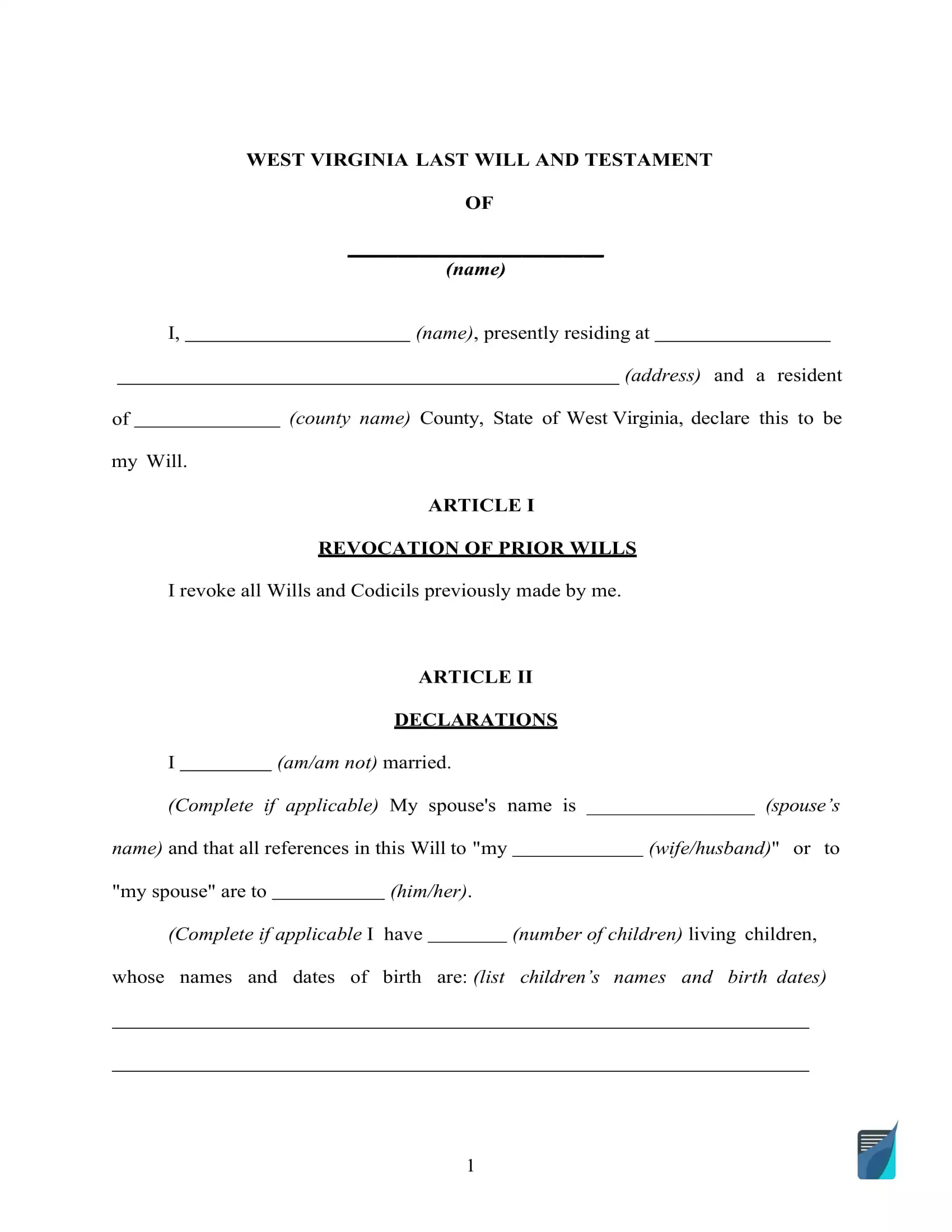
Build Your Document
Answer a few simple questions to make your document in minutes
Save and Print
Save progress and finish on any device, download and print anytime
Sign and Use
Your valid, lawyer-approved document is ready
West Virginia Last Will Laws and Requirements
| Requirements | State laws | |
| Statutes | Chapter 41 – Wills | |
| Signing requirement | Two witnesses | §41-1-3. Must be in writing; witnesses |
| Age of testator | 18 or older | §41-1-1. Who may make will and as to what property §41-1-2. Who may not make will |
| Age of witnesses | 18 or older | §41-1-3. Must be in writing; witnesses |
| Self-proving wills | Allowed | §41-5-15. Proof of will while testator living |
| Handwritten wills | Recognized if meeting certain conditions | §41-1-3. Must be in writing; witnesses |
| Oral wills | Not recognized | §41-1-3. Must be in writing; witnesses §41-1-5. Wills of personal estate by soldiers, sailors or nonresidents |
| Holographic wills | Recognized if meeting certain conditions | |
How to Write a West Virginia Will
1. Consider your possible choices. Before getting started, you might want to decide if you want to use the expertise of a lawyer or do the whole thing yourself. In the event that you wish to create the last will and testament by yourself, pick the type you will go for: a handwritten will or a free West Virginia will form.
2. Indicate your details. Add your full name and address (the city, county, and state of residence) to ascertain the testator of the last will. Go through the details you entered along with the rest of the passage, including “Expenses and Taxes.”
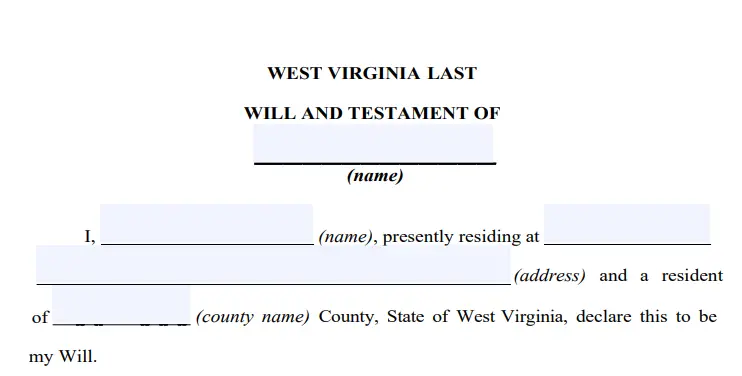
3. Specify the executor (or executrix). Choose the executor of your property and specify their particulars: full legal name and place of residence, which will usually be in the same state the testator lives because the majority of states impose special regulations on out-of-state executors. As a precaution, you may choose a substitute executor of the will. This way, you will be able to be certain that even when the originally appointed executor can’t perform their obligations, there’s a second dependable person you can count on.
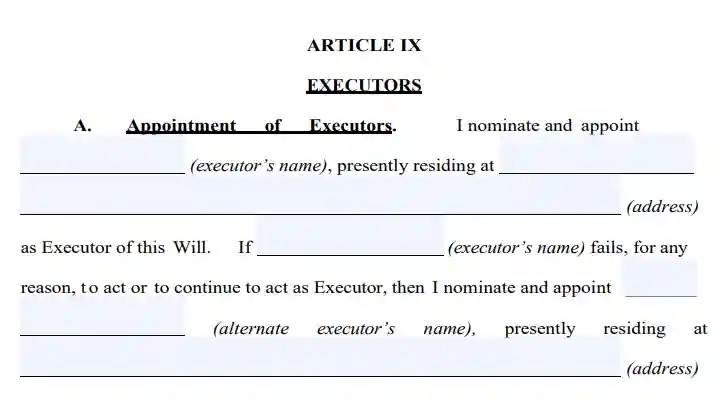
4. Indicate the guardian (optional). In case that you’ve got underage or dependent children and don’t want the court to decide on a guardian for them when you’re no longer on this Earth, it is possible to choose someone you know as a guardian for your children.
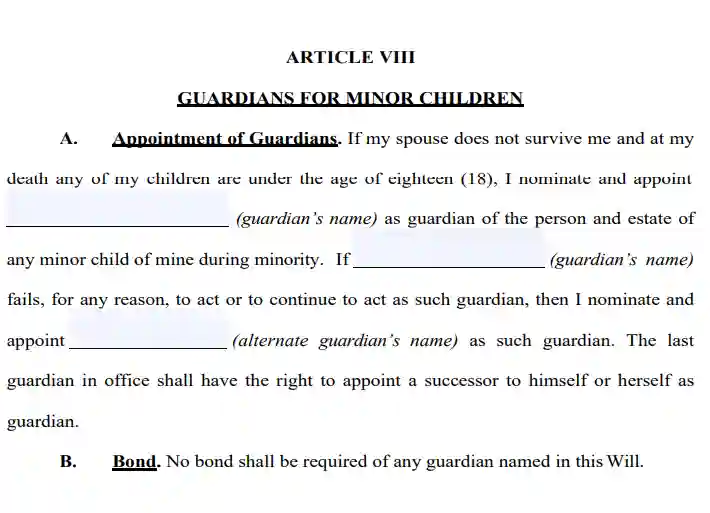
5. Establish your beneficiaries. At this stage, you specify people who are going to inherit your estate. Enter their full names, places of residence, and your relationship to them (spouse, child, friend).
6. Distribute property. If you have a property allocation on your mind that’s not proportional, you’ll be able to describe it in this part. Property may include cash, stocks, realty, company ownership, money for unpaid arrears, and any material things of monetary value in your possession. But, joint and living will property and assets, as well as your life insurance, cannot be put into your last will and testament.
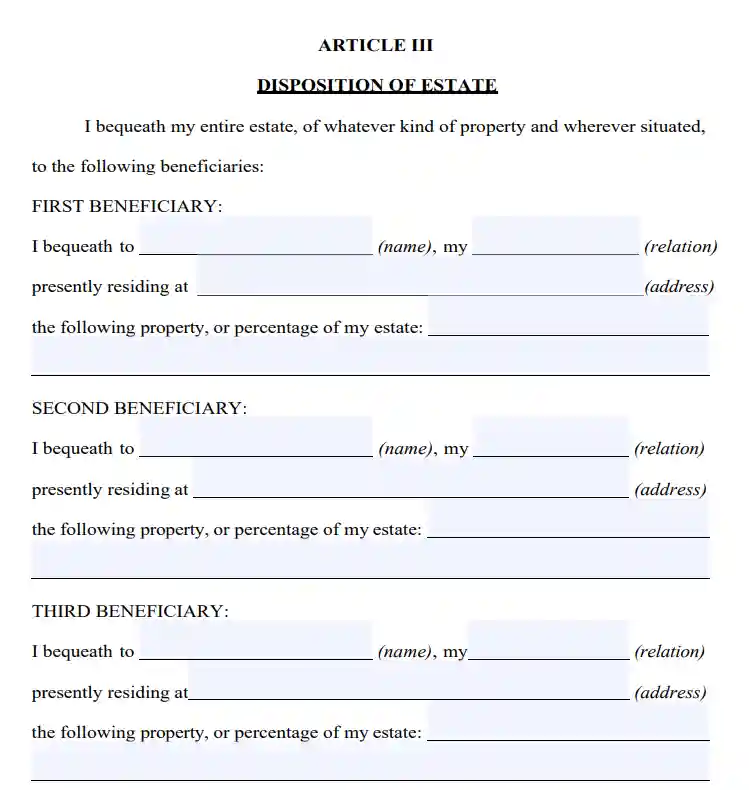
7. Ask witnesses to sign the document. According to West Virginia law, for a will to be considered legally correct, it needs to be signed by two witnesses. You can appoint somebody as a witness as long as they are older than 18 years and are uninvolved in your heritage. Consider choosing witnesses younger than you to make sure that they’ll be around in case the will is contested in the court or if some other issue arises. After a careful review of each section in your last will, all signatories (you and your two witnesses) have to fill out their names and full addresses and sign the document.
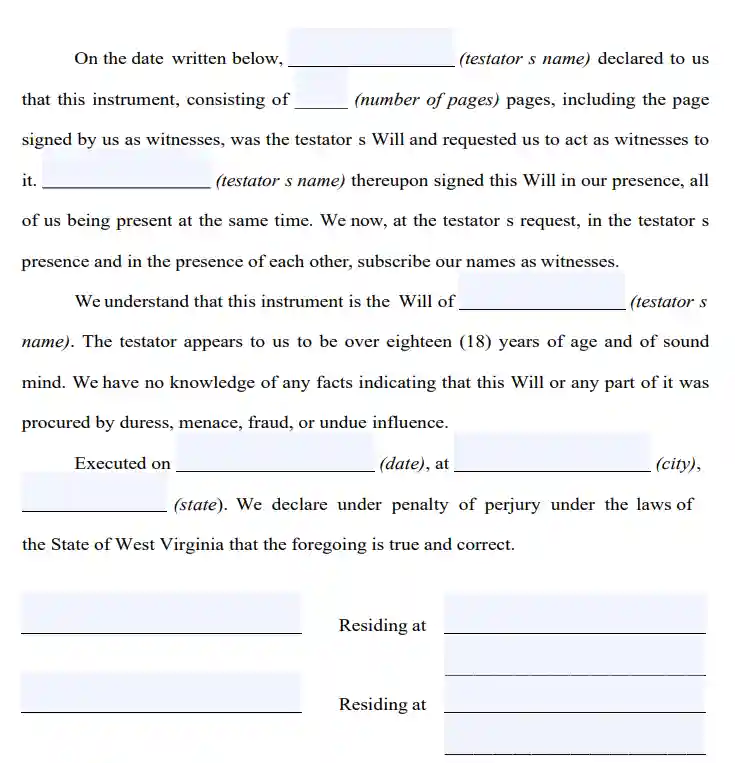
Get a Free West Virginia Last Will Template
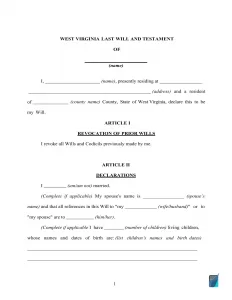

Frequently Asked Questions
Is a West Virginia will form effective without notarization?
In West Virginia, you don’t have to attest your will. However, if you want to add a self-proving affidavit to the last will, you must notarize it. If you make your last will self-proving, the court will not need to contact the witnesses to determine the legality of the document.
Is it possible to disinherit your child or spouse?
If you wish to disinherit your marriage partner, you will be able to do so. West Virginia is not a community property state. Sometimes called marital property, it is a kind of ownership of the assets presented by the laws that implies that 50 % of all assets (including arrears) of one spouse belongs to another and remains such upon divorce. According to §42-3-1 of the West Virginia Code, a surviving spouse will have the option of taking an elective portion of the estate no matter of the last will terms.
As for the others, it is legal in West Virginia to disinherit members of your family in your last will. Your adult children or any other relatives can be legally disinherited totally in your last will. In order to do that, add certain provisions to the last will.
What will happen if I lose my last will and testament?
If the will is lost or destroyed, according to West Virginia law, the court will recognize it. But, only the original of the will can be accepted by the probate court. In line with West Virginia law, the absence of the will is assumed as its cancellation. This suggests that the executor must provide proof of the will’s legality, which might be very troublesome.
For holographic wills, the process can be far more problematic because sworn witnesses and testimony are required. The reason for not providing the last will and its contents has to be confirmed as well.
How can a physically disabled individual sign the last will?
Only per your instruction and in your presence is someone allowed to sign your last will and testament (See West Virginia Estate Code, §41-1-3). It’s possible to give a corresponding instruction via several methods, including verbal communication, a positive answer to a query, or body gestures.
It is possible to get a notary to sign the name of a testator who is physically incapable of doing it if the latter instructs the notary public in the presence of a witness. It is worth noting that such witnesses can’t have an interest (equitable or legal) in any assets that are the issue matter or might be influenced by such a document (the will).
| Related documents | When to create one |
| Codicil | You would like to slightly change your last will without creating a new document from scratch. |
| Self-proving affidavit | You want to keep from possible issues during the probate. |
| Living will | You would like to declare your wishes about the end-of-life medical treatment and life-prolonging measures. |
| Living trust | You would like to deal with your end-of-life matters without probate. |
Last Will and Testament Forms for Other States
